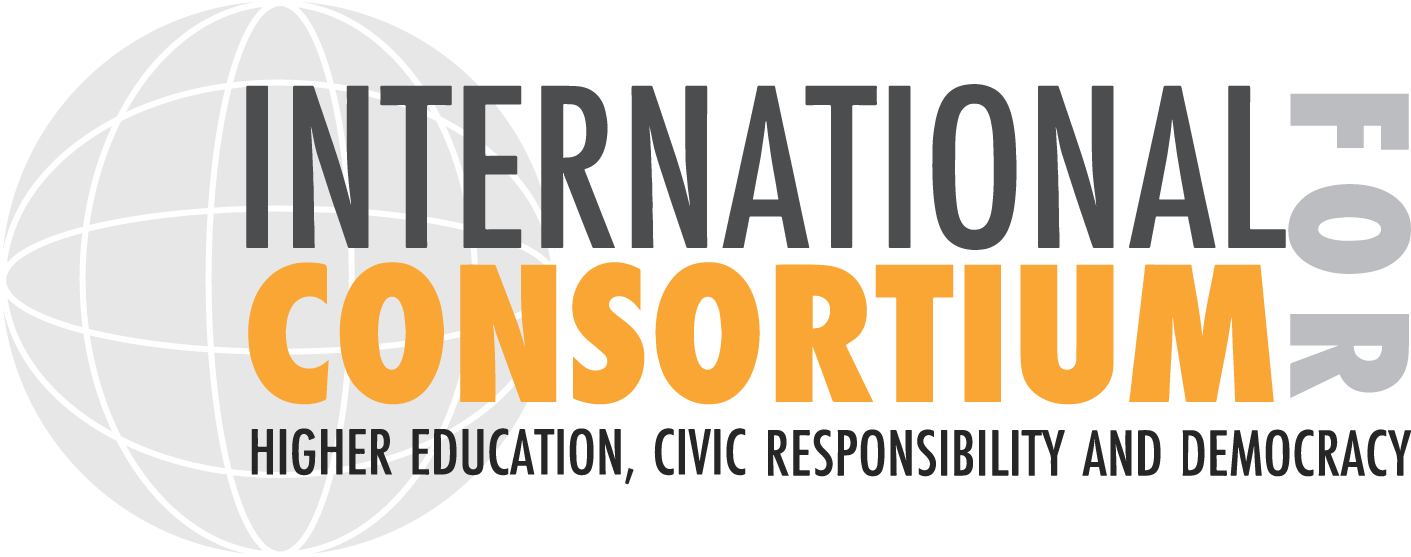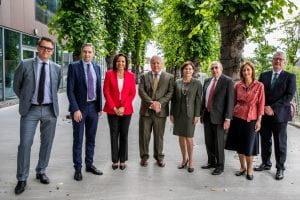
Conferences
The International Consortium for Higher Education, Civic Responsibility and Democracy hosts invitational conferences in collaboration with the Council of Europe through the Council’s Steering Committee for Education, the Organization of American States, and the International Association of Universities. These conferences are designed to engage senior leaders in higher education, particularly university presidents, vice chancellors, and rectors as well as the leadership of major higher education organizations and public authorities, in exploration of the role of higher education in advancing democratic culture.
2022 Conference
The 2022 Global Forum: Higher Education Leadership for Democracy, Sustainability, and Social Justice was hosted 16-17 June 2022 at Dublin City University in Ireland.
Sponsored by the Global Cooperation for the Democratic Mission of Higher Education comprised of the Council of Europe; the International Association of Universities; the International Consortium for Higher Education, Civic Responsibility, and Democracy; and the Organization of American States.
Context:
The COVID-19 pandemic exposed and deepened extreme inequities both in and across countries, as well as highlighted the fragility of democratic systems. At the same time, demands for basic human rights, social and racial justice, and economic equity are increasing in many parts of the world. These developments are occurring as the planet has reached and daily exceeds a climate tipping point.
The need for higher education to promote sustainability and racial and social justice, as well as advance and maintain democracy has never been more apparent.
The 2022 Global Forum on “Higher Education Leadership for Democracy, Sustainability, and Social Justice” gathered some 100 participants from 40 countries to contribute to an international movement that reimagines how universities and colleges work with local and global partners to create more just, equitable, inclusive, sustainable democratic societies. The Forum provided a unique opportunity for representatives from around the world to critically explore and actively contribute to realizing higher education’s democratic mission. In addition, a pre-conference was hosted by DCU in the Community.
The 2022 Global Forum serves as the first gathering co-hosted by the Global Cooperation for the Democratic Mission of Higher Education formed in 2021 between the Council of Europe, the International Association of Universities, the International Consortium for Higher Education, Civic Responsibility and Democracy, and the Organization of American States. It marks the seventh global forum convened by the Council of Europe and the International Consortium who have worked in cooperation since 1999.
Outcomes:
- An increased commitment to higher education leadership for democracy, sustainability and social justice.
- A better understanding of how this commitment can be put to practice in different parts of the world.
- A volume in the Council of Europe Higher Education Series.
About the Global Forum
- Dublin City University Conference Webpage
- Global Forum 2022 Final Program
- Global Forum 2022 Speakers Biographies
- Background on the Global Cooperation
- Photos from the 2022 Global Forum
- Press Release
- Article in University World News by conference organizers
- Book based on the Global Forum (part of the Council of Europe Higher Education Series, No. 26) – available via Open Access

Pictured: Matjaž Gruden, Director of Democratic Participation, Council of Europe; Minister Simon Harris, Minister for Further & Higher Education, Ireland; Higher Education; Kim Osborne, Executive Secretary for Integral Development, Organization of American States; Prof Ronaldo Munck, Director of the Centre for Engaged Research, Dublin City University; Yadira Pinilla, Organization of American States; Ira Harkavy, Chair, International Consortium for Higher Education, Civic Responsibility, and Democracy; Hilligje van’t Land, Secretary General, International Association of Universities; Prof Daire Keogh, Dublin City University President
2019 Conference
“Academic Freedom, Institutional Autonomy, and the Future of Democracy” was hosted 20-21 June 2019 at the Council of Europe in Strasbourg.
Sponsored by the Council of Europe; the International Consortium for Higher Education, Civic Responsibility, and Democracy; and the Organization of American States.
Context:
Academic freedom and institutional autonomy are essential to democracy as well as to quality research and teaching. Over the past few years, these fundamental values of democracy have come under increasing pressure in many countries across the globe, in a context where scientific research, learning, and the very idea of facts are questioned or ridiculed. Some attacks on fundamental academic values are dramatic and the focus of news reporting. Others seem less dramatic, but nevertheless pose serious long term challenges to academic freedom, institutional autonomy, and the future of democracy.
The Global Forum brought together perspectives and experiences from Europe, North America, and other parts of the world to develop a better and more nuanced understanding of the relationship of academic freedom and institutional autonomy to democratic culture, as well as the role of higher education in developing that culture. The conference also helped higher education leaders as well as public authorities develop policies that increase higher education’s contribution to democracy in modern, complex societies.
This was the sixth Global Forum that has developed as a core component of the ongoing cooperation among the Council of Europe, the International Consortium for Higher Education, Civic Responsibility and Democracy, and as of April 2018 the Organization of American States, to promote democracy, human rights and the rule of law. The Magna Charta Observatory and the International Association of Universities were also partners in the 2019 Global Forum, which was hosted at the Council of Europe’s headquarters in Strasbourg.
Outcomes of the Global Forum:
- An increased understanding of and commitment to academic freedom and institutional autonomy in advancing democratic societies.
- A better understanding of how higher education can work with public authorities to advance its democratic mission.
- Input to the ongoing consideration of academic freedom and institutional autonomy within the European Higher Education Area (Bologna Process) in preparation of its next Ministerial conference in June 2020.
- A volume in the Council of Europe Higher Education Series
2017 Conference
Invitational Global Forum on
“Higher Education for Diversity, Social Inclusion, and Community: A Democratic Imperative”
June 13-16, 2017
Rome, Italy
Sponsored by the Council of Europe; the International Consortium for Higher Education, Civic Responsibility and Democracy and the European Wergeland Centre in collaboration with host campuses, Australia Catholic University and LUMSA University.
Context: Democracy is faced with serious challenges, including mistrust of democratic institutions, increasing political, educational, and economic inequalities, alienation, rising intolerance, and defiance of cultural diversity. Higher education must play an essential role in building a culture of democracy based on furthering inclusion, recognizing the value of diversity, and fostering democratic communities.
This is the fifth global forum that has developed as a core component of the ongoing partnership between the Council of Europe and the International Consortium for Higher Education, Civic Responsibility and Democracy to promote democracy, human rights and the rule of law, as well as social cohesion and intercultural dialogue through higher education. The 2017 Global Forum is sponsored by the Council of Europe; the International Consortium for Higher Education, Civic Responsibility and Democracy; the European Wergeland Centre; and the host universities, LUMSA University and Australian Catholic University, Rome Centre.
The Forum will gather some 100-150 higher education leaders and representatives of public authorities and NGOs from Europe, the United States, Canada, Australia, Asia, Africa, the Middle East and Latin America.
Aims and Objectives:
- An increased commitment to higher education’s contribution to developing and advancing a culture of democracy.
- A better understanding of how higher education can work democratically with communities to promote inclusion and diversity.
- A volume in the Council of Europe Higher Education Series.
Additionally, there were two-preconferences. The first was hosted by Australian Catholic University-Rome Centre and the Sant’Egidio community that is working with refugees in Rome. The second was an invitational meeting on “Higher Education Institutions as Local Actors” hosted by the Council of Europe in collaboration with the Anchors Institution Task Force.
LUMSA University Forum webpage: https://www.lumsa.it/en/international_Global_Forum_2017
Video on Global Forum: https://www.youtube.com/watch?v=CtrzkJv2HwA
Sant’Egidio community: http://www.santegidio.org/pageID/1/langID/en/idLng/1064/HOME.html
Anchors Institution Task Force: http://www.margainc.com/initiatives/aitf/
Publication following Rome Global Forum: Higher Education for Diversity, Social Inclusion and Community: A democratic imperative
2014 Conference
“Higher Education for Democratic Innovation”
June 25-27, 2014
Organized by the Council of Europe (CoE); the International Consortium for Higher Education, Civic Responsibility and Democracy (IC); the European Wergeland Centre (EWC); Queen’s University-Belfast, the European Students’ Union, with the Talloires Network as a sponsor.
Context: This conference was part of the cooperation between different partners committed to promoting democracy, human rights, and the rule of law as well as intercultural dialogue to promote social harmony and justice, and the belief in the key role of education in furthering these goals. The conference venue was selected given the important work that Queen’s University-Belfast has done in building bridges across communal divides in Belfast and, more broadly, Northern Ireland.
Aims and objectives:
- To strengthen the role of higher education in furthering democratic citizenship
- To identify concretely the role that institutions of higher education can play in building mutually beneficial, democratic partnerships with their local communities
- To stress the importance of the involvement of the different stakeholders: academic, administrations, students, local communities
- To develop further strategies to strengthen this role
Participants: The Forum included 110 delegates from 25 countries, representing 85 higher education institutions, non-governmental agencies, and governmental bodies; approximately one dozen college presidents, vice chancellors, and governmental ministers served as featured speakers.
About the Global Forum
Photos and Video from the Global Forum
2011 Conference
Invitational Global Forum on
“Reimagining Democratic Societies:
A New Era of Personal and Social Responsibility?”
June 27-29, 2011
Oslo, Norway
Sponsored by the Council of Europe; the International Consortium for Higher Education, Civic Responsibility and Democracy; the European Wergeland Centre; and the University of Oslo, in cooperation with the International Association of Universities and with support from the Norwegian authorities.
Context: This conference was part of the cooperation between different partners committed to promoting democracy, human rights and the rule of law as well as intercultural dialogue to promote social harmony and justice, and the belief in the key role of education in furthering these goals. The conference was also part of the events marking the 200th anniversary of the University of Oslo.
Aims and objectives:
- To strengthen the role of higher education in furthering democratic citizenship
- To identify concretely the role that higher education can play in reimagining democratic societies
- To stress the importance of the involvement of the different stakeholders: academic, administrations, students, local communities
- To develop further strategies to strengthen this role
Participants: Higher education leaders and representatives of public authorities from the United States and Europe and participants from other parts of the world, as well as NGOs.
Participants were invited by the sponsoring organizations to attend the Global Forum.